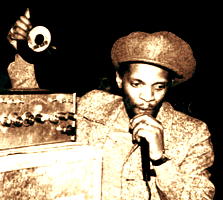| Scroll V : Bass |
- Most synthesizer preset bass sounds are absolutely useless for DUB music. Try to program one
yourself instead:

- Start with a square or triangle wave and filter away almost all of the harmonics using a
low pass filter. You will end up with something close to a sine wave.
- Program the amplifier envelope so that you get a sharp attack and a long sustain phase.
A short peak at the beginning of the curve gives you a nice "finger-pluck"
- Alternatively you could start with a sampled note from a real bass which will result in a more natural sound.
- Off course use the EQ on your mixing desk to boost the low frequencies. (Caution: Filter away frequencies
below ~20 Hz. These will only stress the amps and speakers of the system and not do much for the sound!)
- Collection of Rumours on how distorted Drum&Bass/Jungle bass sounds are made:
- "what i've heard optical (king of basslines) does for alot of his neurosis is take a 909 bass drum,
stretch it out, and filter the piss out of it in a morpheus or compatible piece with z plane filters.
of course old analogue stuff is great. the jupiter is still used alot (doms nyc,ny), junos, moogs.
but another filter over that is helpful so you dont sound too 'electroey', or too 'hooverey'."
(taken from a post of Brian Boland to the breaks mailing list)
- "Something I've been trying lately is synthesizing a raw 60-90hz sine wave, about 5 seconds long, and putting
a tiny bit of decay on it. I'll copy and paste it in a sample editor about 8 or 16 times, and then start
running slow, long effects on the entire mess...phasers, flangers, distortion, echo, anything.
I'll keep adjusting the bass with eq and maxxbass to preserve the frequencies, and eventually come out with
bizarre, droney basslines. Throw some filters and an amplitude envelope on top of it, modulate the
filters and envelope with a Midi CC, and the blines just squawk and screech. The trick in the mix is to
keep the low frequencies strong, keep the mid-range squawk strong, and find a frequency where the mids won't
fuck with your drums...and I still haven't personally nailed the mix..."
(taken from a post of Moth to the breaks mailing list)
- From an interview with german Drum&Bass producers Megashira:
- Start with a low pass filtered square wave. (one single note)
- Adjust the pulse width of the square wave somewhere off center.
- Apply distortion and reverb.
- Take a sample of this and play it with a lot of portamento. Sampling is needed because this way the delay
is cut at the end of each note.
- "A great way to distort bass, like jungle is to reduce bassline's resolution
to 3, 2, 1 (!) bits. Apply a lowpass effect to reduce noise..."
submitted by MESA
- Jungle-Bass: There is an old cheap FM synthesizer: EVS-1 from Evolution. You can buy it from secondhand for
100$. This synth can make the bad distorted FM basses from the D&B tunes. Add hard compression and
little distortion and you´ll have the sound.
Submitted by Lone from http://www.sativa-sounds.de
- Jungle-Bass: Take a sine wave then heavy distortion on it and then filter it with
lowpass.
Submitted by Lone from http://www.sativa-sounds.de
- Opinions on the use of Compression on Bass: Compression can help to get a clearer defined, punchier
bass sound. However not everybody wants that.. Depending on your style you may prefer the "original
earthquake sound". Below you can find two contradictory opinions from users of this site:
- "For earth shuddering basslines: Using your EQ on the desk, filter out any frequency above 600Hz,
and then boost that signal to the max. The most important thing here is to make sure you
DON'T USE ANY COMPRESSION!! A small amount of reverb added after helps smooth the
bass out, into a big round mama for your bass bins. [...]
When you compress the bass, it lifts the floor of the bassline up to about
50Hz, thus loosing that lovely shudder.[...]
The advice about no compression came from ABA SHANTI I. He is the main man in the ABA SHANTI
sound system, he gave me this advice himself - check his sound, an try tell
me you have heard a bigger bassline anywhere else - you won't have."
Submitted by Stonelion
- "If you don't use compression and you want your tunes get played by soundsystems it's gonna sound horrible
and muddy. Compression on bass and kicks is very important. Try settings like fast attack halfway release
and 6 or 7 to 1 ratio depending on the strings and or tubes used.[...]
A couple of years ago i was forced not to use a compressor because of a too small wallet. So there were
some labels who were going to release my tunes but they asked for new mixes because of the bass.[...]
and also i got complaints from soundsystems that played my tunes that the bass was too muddy.[...]
btw i learnt this from Russ D (The Disciples), in his early days , he was also struggling
with too much bass.
Submitted by dubcreator
- "For earth shaking bass take the sound, whatever it is and run it through a low pass filter. Turn the resonance all the way up and turn the cut ALMOST all the way down."
Submitted by TRAUMA
- "Play/Perform BASS all the way through the song/track (if you can, of course). Play real Bass Guitar (or play Bass guitar through what
ever processors you have, try to experiment, to find your favorite way). But, really, even if you play real bass through some cheap pedal,
like ZOOM-506, you may get better bass lines for dub riddm', then trying sequencing some synth, especially if you have digital/sample-ROM
based synth. There is SOOOOOOO much what's going on with the sound coming from real string, plus the whole feel of groove, which
simply impossible to achieve by sequencing (even if you are advanced user). Bass in Dub, as I see is really the leading voice, so if
it's mechanical/dead...then your dub is sort of dead too.... If I go more romantic here, I'd say BASS must have SOUL in Dub."
Submitted by Mike Zee (ZEE DUB LAB METAL DOOR DUB)

- Excerpt from "Bill Laswell's Trance Mission", Bass Player Magazine, 11.96, by James Rotondi:
What goes into getting that thick, blunt bass tone? - Certainly it's partly the strings and
the instrument. Dub players generally use only flatwound strings, and you need a solid instrument
that resonates and stays in tune. There's no need for the treble, so you roll it all off.
But first of all consider how you play: what's the approach? There are a million different simple
fingerstyles; there's a muting technique with the thumb, or you can mute with the thumb and
finger - but, again, it's a science, and you have to hook up all that with the rhythm in a way that's
believeable... I sometimes use an amp, but a lot of times I go direct because I use a lot of
dbx Subharmonic Synthesizer; it's a device that boosts all the low end. People used to use 'em in
discos for kick drums. I use either that or a DOD Envelope Filter, which - if you play really softly
and don't open the filter - gives you a massive amount of bottom.
submitted by Don Winblad
- bass guitar: Never change the strings on your bass. This keeps the sound low and flabby.
Submitted by I.W.
- bass guitar: In addition to never changing the strings, use Flatwound strings, not the more common
roundwound ones. This will get you closer to a dub tone instantly. Play with your fingers, or for
simple parts, play with your thumb(not slapping, but plucking with the meat of the thumb very
consistently). You can't go wrong with a Fender Precision bass, flatwound
strings, and a decent preamp, like the Sadowsky bass preamp.
Submitted by Greg Reeves
- bass guitar: If you have a dual pickup bass, get flatwound strings as recommended by
others, use only the pickup nearest the neck, turn the volume on the other
one near the bridge completely. turn the tone down (ie filter out the higher
frequencies). use lots of compression. if the riddum allows it, play lines
on the low E & A up the neck rather than on the D & G strings down the neck.
this gives a 'fatter' more acoustic sounding bass tone.
submitted by scot mcfee
- bass guitar: Use upright bass strings on an electric.They sound deep & throbby,great
for dub,reggae,funk,etc.I personnaly hate electric bass strings cuz they sound too clean & trebly.
Apparently you can get "flat-wound" strings(like an upright's) for electric basses,but I've never seen
em at my local music store.
Submitted by Sean Oliver
- bass guitar: For a real nice bass sound use a combination of mic'ed and D.I.'d signals to produce
deep bass with good clarity. Don't forget to use a slight delay on the D.I.'d signal to avoid phase
problems.
Submitted by Curly B
- bass guitar: I've read that a popular recording technique for bass was to take a PZM
microphone and stick the plate under the bass amp. I've done that too, and
it sounds killer.
Flatwounds are the shit, too.
submitted by hotstrikes
- Whack your bass guitar thru a 'Boss Bass EQ' pedal boost 50hz to the max and cut everything else,
turn the tone treb on your guitar down too,then in to desk,or amp or what ever ooooh lovey.
Even better on a 5 string + Subtle octave pedal
submitted by Pip Harper
- While looking for an octave pedal (for those low frequencies...) I came across the MXR Blue Box
pedal. Its an octave fuzz like no other!!! If you want monster sounding whale bass , this is the pedal to
get! and it also does a better sounding synth impression than the boss SYB 3 (which is not great).
Definitely not for the faint hearted , it sounds great also on bass and does really weird things to drum
machines
Submitted by the Nematod
- Always record at 15 ips, not 30 ips. This lowers the octave of the tape and gives a heavier and
dirtier bottom end.
Submitted by I.W.
- try pitching down 808 and 909 sounds way down
Submitted by the Nematod
- When using sub-bass, distort it a little first to give it some definition .
Submitted by the Nematod
- old analogue synths such as the roland juno 106 and jupiter 6 are excellent and so is the yamaha dx100 (as
used by orbital and Sly & Robbie)
Submitted by the Nematod
- How to make low ass bass using a Nord Modular: set a classic LP filter cutoff to 31Hz and the resonance
above 125... this will cause the filter to self oscillate.... and create heartworming bass tones...
play with the filter cutoff to create awesome sweeps...
submitted by Jeremy Winters
send additions to The Interruptor
|
|



